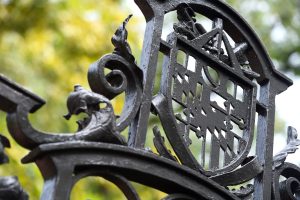
When Alaleh Azhir came to the United States at age 14 from Iran, she discovered that she was already fluent in a language that transcends both borders and cultures: mathematics.
A seasoned participant in math competitions in her hometown of Mashhad, Iran, she began competing in the U.S. as a way to meet people.
“Being able to speak the language of math better than English helped me find friends and allowed me to adjust to my life here better—which drove my interest in mathematics further,” she says.
On Saturday, the Johns Hopkins senior—who has a triple major in biomedical engineering, computer science, and applied mathematics and statistics—was awarded a Rhodes Scholarship, which is among the oldest and best-known awards for international study.
Established in 1902, the Rhodes Scholarship recognizes students on the basis of outstanding academics and leadership, and winners receive full funding to pursue a degree at Oxford. Azhir was one of 32 American students to be selected for the award from an applicant pool of 880.
“This year’s American Rhodes Scholars—independently elected by 16 committees around the country meeting simultaneously—once again reflect the extraordinary diversity that characterizes the United States,” said Elliot F. Gerson, the American Secretary of the Rhodes Trust. “Almost half of the winners are immigrants themselves or first-generation Americans. … They are certain to enrich our future.”
At Oxford, Azhir will work toward her master’s degree in women’s and reproductive health—a field that combines her love of math, data, and statistics with her interests in health, biology, and the human genome. With advances in data collection, storage, and computational analysis, as well as decreases in costs, Azhir sees genomics as a health care field of the future.
“In a decade or two, genomics will be part of routine health care,” she predicts.
While at Oxford, she will use data collected by the United Kingdom’s National Health Service to understand how difficult pregnancies contribute to heart problems for women in later life. She hopes to use NHS data to create models that help predict—and prevent—these health outcomes.